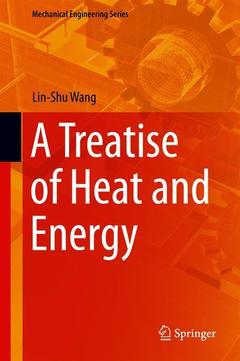A Treatise of Heat and Energy, 1st ed. 2020 Thermodynamics as a Predicative Entropic Theory of Heat Mechanical Engineering Series
Auteur : Wang Lin-Shu

Brings forth students’ understanding of how heat and work are different and why the principle of their inter-convertibility (i.e., exchangeability) should be rejected;
Elucidates the constructive role of entropy growth, and the notion that energy matters, but entropy growth matters more;
Demonstrates that heat can be transferred, produced, and extracted;
Teaches readers that all reversible-like processes are heat extraction processes and how this understanding will revolutionize the design of future buildings.
Date de parution : 12-2019
Ouvrage de 301 p.
15.5x23.5 cm
Disponible chez l'éditeur (délai d'approvisionnement : 15 jours).
Prix indicatif 79,11 €
Ajouter au panierThèmes d’A Treatise of Heat and Energy :
Mots-clés :
Thermodynamics undergraduate textbook; Work and power; first law of thermodynamics; second law of thermodynamics; Energy efficiency; Entropy; Mechanical equivalent of heat; Mechanical theory of heat; Heat extraction; Thermally activated building systems (TABS); Homeostasis in buildings; Mechanical homeostasis; Building thermal mass requirement



